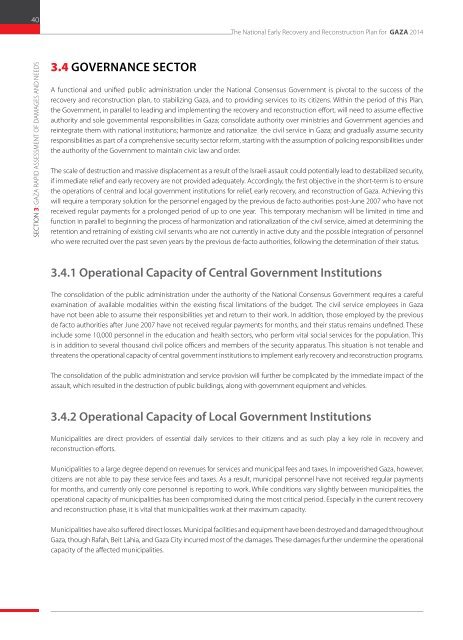National Early Recovery and Reconstruction Plan for Gaza 2014-2017_FINAL
National Early Recovery and Reconstruction Plan for Gaza 2014-2017_FINAL
National Early Recovery and Reconstruction Plan for Gaza 2014-2017_FINAL
Create successful ePaper yourself
Turn your PDF publications into a flip-book with our unique Google optimized e-Paper software.
40The <strong>National</strong> <strong>Early</strong> <strong>Recovery</strong> <strong>and</strong> <strong>Reconstruction</strong> <strong>Plan</strong> <strong>for</strong> <strong>Gaza</strong> <strong>2014</strong>SECTION 3: GAZA RAPID ASSESSMENT OF DAMAGES AND NEEDS3.4 Governance SectorA functional <strong>and</strong> unified public administration under the <strong>National</strong> Consensus Government is pivotal to the success of therecovery <strong>and</strong> reconstruction plan, to stabilizing <strong>Gaza</strong>, <strong>and</strong> to providing services to its citizens. Within the period of this <strong>Plan</strong>,the Government, in parallel to leading <strong>and</strong> implementing the recovery <strong>and</strong> reconstruction ef<strong>for</strong>t, will need to assume effectiveauthority <strong>and</strong> sole governmental responsibilities in <strong>Gaza</strong>; consolidate authority over ministries <strong>and</strong> Government agencies <strong>and</strong>reintegrate them with national institutions; harmonize <strong>and</strong> rationalize the civil service in <strong>Gaza</strong>; <strong>and</strong> gradually assume securityresponsibilities as part of a comprehensive security sector re<strong>for</strong>m, starting with the assumption of policing responsibilities underthe authority of the Government to maintain civic law <strong>and</strong> order.The scale of destruction <strong>and</strong> massive displacement as a result of the Israeli assault could potentially lead to destabilized security,if immediate relief <strong>and</strong> early recovery are not provided adequately. Accordingly, the first objective in the short-term is to ensurethe operations of central <strong>and</strong> local government institutions <strong>for</strong> relief, early recovery, <strong>and</strong> reconstruction of <strong>Gaza</strong>. Achieving thiswill require a temporary solution <strong>for</strong> the personnel engaged by the previous de facto authorities post-June 2007 who have notreceived regular payments <strong>for</strong> a prolonged period of up to one year. This temporary mechanism will be limited in time <strong>and</strong>function in parallel to beginning the process of harmonization <strong>and</strong> rationalization of the civil service, aimed at determining theretention <strong>and</strong> retraining of existing civil servants who are not currently in active duty <strong>and</strong> the possible integration of personnelwho were recruited over the past seven years by the previous de-facto authorities, following the determination of their status.3.4.1 Operational Capacity of Central Government InstitutionsThe consolidation of the public administration under the authority of the <strong>National</strong> Consensus Government requires a carefulexamination of available modalities within the existing fiscal limitations of the budget. The civil service employees in <strong>Gaza</strong>have not been able to assume their responsibilities yet <strong>and</strong> return to their work. In addition, those employed by the previousde facto authorities after June 2007 have not received regular payments <strong>for</strong> months, <strong>and</strong> their status remains undefined. Theseinclude some 10,000 personnel in the education <strong>and</strong> health sectors, who per<strong>for</strong>m vital social services <strong>for</strong> the population. Thisis in addition to several thous<strong>and</strong> civil police officers <strong>and</strong> members of the security apparatus. This situation is not tenable <strong>and</strong>threatens the operational capacity of central government institutions to implement early recovery <strong>and</strong> reconstruction programs.The consolidation of the public administration <strong>and</strong> service provision will further be complicated by the immediate impact of theassault, which resulted in the destruction of public buildings, along with government equipment <strong>and</strong> vehicles.3.4.2 Operational Capacity of Local Government InstitutionsMunicipalities are direct providers of essential daily services to their citizens <strong>and</strong> as such play a key role in recovery <strong>and</strong>reconstruction ef<strong>for</strong>ts.Municipalities to a large degree depend on revenues <strong>for</strong> services <strong>and</strong> municipal fees <strong>and</strong> taxes. In impoverished <strong>Gaza</strong>, however,citizens are not able to pay these service fees <strong>and</strong> taxes. As a result, municipal personnel have not received regular payments<strong>for</strong> months, <strong>and</strong> currently only core personnel is reporting to work. While conditions vary slightly between municipalities, theoperational capacity of municipalities has been compromised during the most critical period. Especially in the current recovery<strong>and</strong> reconstruction phase, it is vital that municipalities work at their maximum capacity.Municipalities have also suffered direct losses. Municipal facilities <strong>and</strong> equipment have been destroyed <strong>and</strong> damaged throughout<strong>Gaza</strong>, though Rafah, Beit Lahia, <strong>and</strong> <strong>Gaza</strong> City incurred most of the damages. These damages further undermine the operationalcapacity of the affected municipalities.


